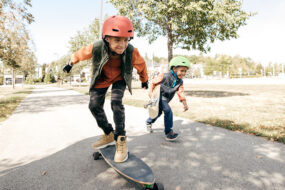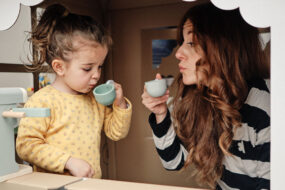Sleep or exercise: Which is more important to kids’ health?
Both sleep and physical activity are vital to kids’ development – but when competing life demands put a squeeze on their time, should you prioritise one over the other?
More quality sleep and physical activity – and less time sitting in front of a screen – can boost the physical and mental health of children, says new research.
The University of South Australia study of 1179 children aged 11 and 12 looked at sleep and exercise “trade-offs” over a 24-hour period.
And its findings offer some insights into how busy families can make the most children’s time to help them stay fit and well.
“There are many competing time demands in modern families – whether it’s after-school soccer, music lessons or simply walking the family dog,” reports lead researcher Dr Dot Dumuid.
“Finding the time to fit everything into a single day can be a challenge.
“With so many competing priorities and commitments, it’s helpful to know which activities deliver the greatest ‘bang for your buck’.”
- Bedtime routine: Simple strategies to improve your child’s sleep
Sleep, exercise and sitting down
The study calculated how much sleep, exercise and sitting time deliver equivalent physical and mental health benefits to children.
It found activity is important and efficient for staying physically healthy, with an extra 17 minutes of moderate to vigorous physical exercise achieving a 7.4 reduction in body mass index (BMI).
But sleeping an extra 52 minutes or reducing sitting time by 56 minutes a day achieved the same result.
Similarly, children can boost their mental health by exercising for 35 minutes more a day, sleeping an extra 68 minutes, or reducing sitting time by 54 minutes.
The takeout? Exercise is the quickest way and most effective way to boost kids’ physical and mental health – but it’s not the only way.
“For families with very little available time, small increases in moderate-to-vigorous exercise could be an option to improve children’s health and wellbeing; alternatively an earlier night could equally deliver the same health benefits – importantly, it’s the flexibility that these findings offer that make them so valuable,” Dr Dumuid says.
- Cool runnings: Why winter sport is good for kids
How to find the right sleep v exercise formula for your kids
Raisingchildren.net.au acting executive director Dr Naomi Hackworth says balance is key for young minds and bodies.
“Sleep restores children physically, helps them learn and remember things and boosts immunity,” Dr Hackworth says.
“Parents can support their children by helping them to establish a good bedtime routine, minimising sugary or caffeinated food or drinks and switching off screens at least an hour before bedtime.
“Physical activity is also vital for a child’s health, wellbeing and development. It strengthens bones, muscles, heart and lungs, helps children remain a healthy weight and helps them to concentrate, learn, relax and sleep better.
“Parents can help children by being physically active too, and by playing sport or going outdoors together or building activity into daily routines by walking or biking to school.”
- Get active: 7 types of play that are awesome for kids
How much sleep, exercise and screen time should kids get each day?
The Department of Health recommends the following guidelines for children:
Toddlers aged 1 to 2
- Three hours of physical activity.
- No screen time under the age of two years, and one hour a day for kids aged 2-5.
- 11 to 14 hours of sleep, including naps.
Preschoolers aged 3 to 5
- Three hours of physical activity including one hour of energetic play.
- One hour of screen time.
- 10 to 13 hours of sleep.
Children aged 5 to 17
- One hour of moderate to vigorous physical activity, with vigorous activity at least three days a week. For example, football, basketball, dancing, bike riding. Include muscle and bone strengthening activities three days a week. Plus daily light physical exercise such as walking to school or household chores.
- Two hours of screen time.
- 11 hours of sleep for 5 to 13 year olds. Eight to 10 hours of sleep for kids aged 14 to 17.
Written by Sarah Marinos.





